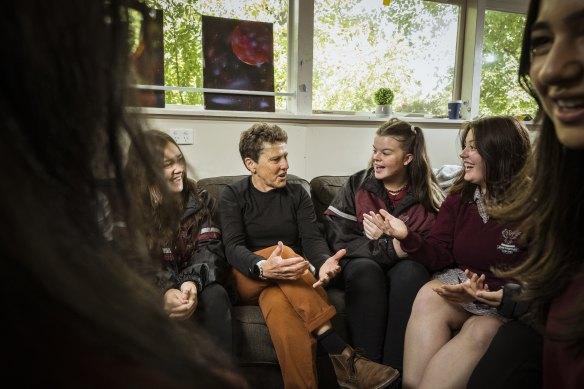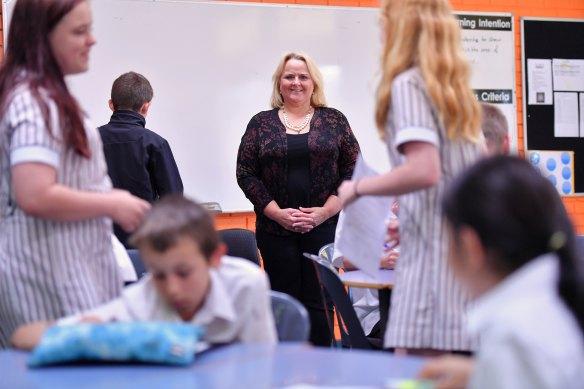Principal's Message & The Age Article

Dear parents and students
Thank you for a very busy and productive term.
I am pleased to present here some positive media attention - I hope you enjoy reading this.
Have a wonderful break - see you back on Wednesday 26th April
Lisa Vinnicombe
How to fix a failing school
ByAdam Carey
April 3, 2023
The day before Dr Lisa Vinnicombe started working at John Fawkner College, students spread a rumour that a gang of outsiders were poised to invade the school grounds to start a fight.
Teachers at the school in Melbourne’s north initiated a snap lockdown, confining students to their classrooms.
An assistant principal phoned Vinnicombe – who had just been appointed executive principal – and asked her if she had signed her contract yet. If not, did she want to back out?
John Fawkner College executive principal Dr Lisa Vinnicombe with students from the school’s Women’s Business Club.
She didn’t, but Vinnicombe, who was recruited from high-performing inner-city state school University High, was shocked by the dysfunctional school environment she entered.
“I came into a school where many students were roaming the corridors and they were described as the transients, where the school had a very high level of absenteeism and an ambivalence towards education that I found difficult to comprehend,” she said.
Vinnicombe has been at John Fawkner since November 2021. She is one of Victoria’s executive principals – highly qualified leaders tasked with turning around a poor-performing school. It’s involved some hard decisions.
The lengthy lockdowns of the pandemic did severe damage to the education of some students of John Fawkner, particularly those who lacked parental support at home.
Some senior students fell so far behind in 2020 and 2021 that when they returned last year, they had stopped engaging.
School was no longer the best place for them, Vinnicombe decided. She initiated a series of exit interviews with them and their families, finding pathways in TAFE, apprenticeships or work.
The strategy was risky. The school lost students, and therefore government funding, but it also provided an opportunity for a restart.
“We had to stage some sort of response to the COVID years and not pretend life will go on like it was before; it changed too dramatically,” Vinnicombe said.
“And so my response needed to be, ‘I need to do something different here because the school needs to get back on its feet’.”
Vinnicombe has also been selective about new staff, even amid a teacher shortage, only hiring teachers who are committed to building a strong culture of learning in a tough school.
Efforts to rejuvenate the senior school are under way, with students given a choice between traditional VCE and a vocational stream focused on building skills for work.
“It’s really crucial for us to create a sense of urgency amongst our students, to really put learning forward as the number one priority at our school,” Vinnicombe said.
Lunchtime clubs have been launched, such as the Women’s Business Club for female students.
John Fawkner is a small school. Its enrolments have shrunk to fewer than 300 students this year. Vinnicombe is working on a plan to combine with other nearby schools to expand the range of VCE subjects on offer.
The college was also promised $14.5 million in last year’s state election campaign, which will go towards replacing crumbling, 70-year-old classrooms with new learning spaces.
A transition officer is working with local primary schools to promote the school’s new direction.
“Along with that is bringing in parents and working with them to create the school of choice in the area,” Vinnicombe said.
But restoring community confidence in a school is a long road. It can take several years.
Gail Major began as executive principal of Scoresby Secondary College in 2014, when enrolments were in freefall. The school had 92 year 12 students leaving, and just 15 year 7 students coming in.
The school in Melbourne’s east was failing, Major said.
Students arrived with average NAPLAN scores and left with below average VCE results. Teachers lacked professional support. In interviews, all but one said they wouldn’t send their own children to the school.
The school had a collection of mountain bikes and canoes and five food technology staff, but just one qualified maths teacher.
It has taken several years for Scoresby Secondary College executive principal Gail Major to begin to shake off the school’s poor reputation
Major’s initial efforts to transform the school environment were not welcomed by all.
“The community that was in there thought it was fantastic because their kids liked going there for the wrong reasons, and that was challenging,” she said.
Major brought in new early career teachers and overhauled teaching practices. She made connections with local industry, generating internship opportunities for students.
The school’s NAPLAN and VCE data improved significantly between 2015 and 2018 as students made high gains in their literacy and numeracy scores.
But Major believes the greatest measure of a school’s success is having engaged students.
“You’ve got to bring everyone along,” she said.
“I’ve never been one to say you need to leave the school to get our year 12 results up. I’ve taken in some students whose self-esteem has been destroyed through that process.
“Success to me is that they are engaged. They’re loving to coming to school.”
There are signs the wider community is finally seeing the change.
Last year, two primary school principals in the college’s catchment visited for the first time in years. And next year, the year 7 intake will expand from three classes to four.
Extra enrolments will bring extra resources and, Major hopes, boost the case for capital funding to modernise the school’s ageing facilities.
“We are in a good place; it would be wonderful to have the facilities and everything to go with it,” Major said.
Link:
Victoria education system: How to fix a failing school (theage.com.au)


